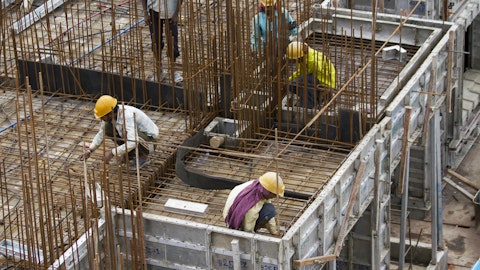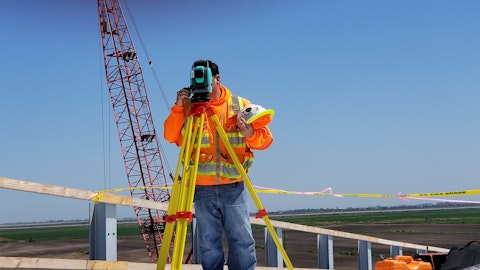View, Inc. (NASDAQ:VIEW) Q4 2022 Earnings Call Transcript March 29, 2023
Operator: Greetings. And welcome to the View, Inc.’s Fourth Quarter and Full Year 2022 Earnings Call. At this time, all participants are in a listen-only mode. A question-and-answer session will follow the formal presentation. As a reminder, this conference is being recorded. It is now my pleasure to introduce your host, Samuel Meehan, Head of Investor Relations at View. Thank you, Samuel. You may begin.
Samuel Meehan: Good afternoon, everyone. And welcome to View’s fourth quarter and full year 2022 earnings call. I am Samuel Meehan, Head of Investor Relations at View. I am here with Dr. Rao Mulpuri, our CEO; and Amy Reeves, our CFO. Before we begin, I’d like to remind you that after market closed today, View issued a press release announcing its fourth quarter and full year 2022 financial results. You may access this press release in the Investor Relations section of view.com. As today’s discussion includes forward-looking statements, please refer to our press release for a discussion of factors that could cause the company’s actual performance to differ materially from these forward-looking statements. These forward-looking statements involve risks and uncertainty, many of which are beyond our control and could cause actual results to differ materially from our expectations.
These forward-looking statements apply as of today, and we undertake no obligation to update these statements after our call. For a more detailed description of certain factors that could cause actual results to differ, please refer to our filings with the SEC, including our most recent annual report on Form 10-K and subsequent filings, including quarterly reports on Form 10-Q. I would also like to remind you that during the call we will discuss certain non-GAAP measures related to Views performance. You can find the reconciliation of these measures to the nearest comparable GAAP measures in the press release. Now I will turn the call over to our CEO, Rao Mulpuri. Rao, over to you.
Dr. Rao Mulpuri: Thank you, Samuel, and thank you all for joining us this afternoon. In our prepared remarks, I will discuss our 2022 highlights and address the important developments since our last call, and Amy will go into details on the financial performance of our business. I am excited to report that View achieved a record year in 2022 with revenues above $100 million for the first time in the company’s history and within the guidance range we issued last year. The View team did an outstanding job and I am very proud of our team’s collective efforts, dedication and relentless execution in building our business. 2022 was a critical year for the company with several notable accomplishments. First, while hitting $100 million in revenues is a historical milestone for the company, what is underlying that is a tremendous effort to create the products and manage the supply chain and manufacturing capabilities, field service, and most importantly, customers that are steadfast partners in this journey to fundamentally make buildings more sustainable, healthier and smarter.
Second, moving to products. Our fourth generation glass is now fully ramped up. The neutral colors produced by our proprietary plasma coatings are well received by designers, owners and users of buildings and will be the new industry benchmark going forward. We launched our multifamily residential product to capitalize on the large and growing opportunity for Smart Windows in the residential sector. I will cover this in more detail shortly. We successfully ramped up our Smart Building Platform, a fully integrated Smart Window product offering. This allows View greater control in optimizing design, performance and cost of the Smart Building envelope, working seamlessly with the real estate ecosystem, and most importantly, provide the best solutions and customer support for our customers.
We continue to innovate in Smart Building technologies, our cloud-based SaaS business to accelerate the digital transformation of real estate, I am pleased to report that this high margin business grew to $11 million in revenue in 2022. Third, our operations continue to scale in improving yield and operational efficiencies within our manufacturing, supply chain and field capabilities. We have plenty of headroom to grow capacity in our existing footprint as we drive awareness and demand for our products. Fourth, we had a major legislative win in 2022 as Smart Windows were included in the investment tax credit. The Federal Government now provides a 30% to 50% tax credit on View Smart Windows as part of the broader effort in the U.S. to accelerate our transition to a more sustainable infrastructure.
Fifth, we completed a $212 million capital raise that was led by strategic real estate investors who are looking to create positive change in the industry. This is a great validation of our business and we are thrilled that our customers are also investing in our company and have become great partners in this journey. It’s important to note that we achieved all of this in spite of the challenging macro environment. The combination of rising interest rates, uncertainty in lending markets and the lingering impacts of the pandemic have all caused change and uncertainty in the real estate industry. These challenges are balanced by secular tailwinds for View, including the industry’s need to build and upgrade buildings that are more sustainable, experiential, healthier and smarter.
Now turning to the key market verticals. Office space is facing pressures from hybrid work models and companies are reassessing their required real estate footprint. Despite this, we continue to see employers strong desire to bring their employees back to work and high quality differentiated buildings are doing quite well in the market. Further, we continue to see renovations and repositioning of aging properties and we also see that life science and labs continue to grow in this cycle. On to airports, which is a very strong sector for View, every major airport in the United States is focusing on sustainability and passenger experience. We continue to see active renovations and new terminals being added across the country and View has installations and ongoing projects at major U.S. airports, including Boston Logan, Chicago O’Hare, Dallas-Fort Worth, San Francisco, New York LaGuardia, Memphis, Charlotte and Phoenix among many others.

Photo by Donny Jiang on Unsplash
Next, the healthcare sector is continuing to build hospitals, as well as medical office buildings and ambulatory care services facilities. Sustainability, patient experience and care for their own employees have become very important for every healthcare leader in the post-COVID environment. View has several signature installations across North America and we are well positioned to grow in this sector. Now turning to the multifamily residential sector, which has shown relative strength in this cycle. There’s a severe shortage of housing in the United States that requires additional capacity to be added in many cities nationwide. We released our multifamily residential product last year and we have seen great excitement from building owners and residents alike.
Our residential product is specifically engineered for the multifamily setting and we built a suite of applications designed around the individual user. For example, we recently launched the sleep in mode on the View mobile app. Sleep and mode allows users to keep their apartments cool and dark in the morning until they are ready to start their day at a predetermined wake-up time. When the user wants to wake up, View Smart Windows gradually clear, gently waking up residents with natural light. Essentially, users can program their sunrise. We are gaining market momentum in this very important sector. Earlier this week, we announced that RXR selected View’s Smart Windows for their Hamilton Green large scale mixed-use project in New York. This represents Views largest multifamily project to-date and is the latest of several notable projects in multifamily, including 4650 Broadway and Sven in the New York area, along with projects in Seattle, DC area, Boston, Toronto and Vancouver.
Looking ahead, we are focused on key platform customers with large nationwide portfolios in the multifamily vertical that see higher value in our product and want to differentiate their buildings. We are also redoubling our focus on the institutional sector, notably airports and health care. A narrower focus of our business around these high quality customers allows us to reduce sales friction, drive repeat business and enable a more efficient path to profitability. Now shifting gears to the year ahead. In 2023, we look to build on our accomplishments from last year. We all know that the macro environment, particularly for real estate is tough and uncertain. And not surprisingly, some of our existing customers have seen delays in their projects.
In spite of these headwinds, we have a committed backlog for 2023 that already exceeds 2022 revenues. As we have said before, our business is less about the macro and more about adoption. We have a healthy project pipeline to drive substantial growth in 2023 and beyond. In order to continue to drive efficiencies and recognizing the uncertainty in the markets, we have taken proactive steps to lower our fixed costs and the breakeven point so that we can achieve profitability milestones at a significantly lower revenue level. We will be talking about 2023 in more detail on our Q1 earnings call coming up shortly. With that, I will hand it over to Amy to cover the financials. Amy, over to you.
Amy Reeves: Thank you, Rao, and good afternoon, everyone. I will be covering the financial results for the fourth quarter and full year 2022. As we get started, please note that unless otherwise stated, my comments refer to non-GAAP results of operations as discussed described by Samuel at the beginning of the call. Please refer to the non-GAAP reconciliations in our press release. For the quarter, we reported revenue of $44 million, which represents a 56% year-over-year increase from Q4 2021 due to growth across all product lines, including Smart Glass, Smart Building Platform and Smart Building Technologies. We continue to see an acceleration in the strategic transition towards our Smart Building Platform business and expect this to continue in 2023.
For the fourth quarter, we increased not only the number of Smart Building Platform projects compared to a year ago, but we are also increasing the average size of the project. For the full year 2022, we reported revenue of $101 million, representing 37% year-over-year growth, compared to $74 million in 2021 and within our guidance of $100 million to $110 million. The strong revenue growth was driven by momentum in our Smart Building Platform and Smart Building Technology products. Our Q4 2022 non-GAAP cost of revenues increased 29% year-over-year from Q4 2021, primarily driven by higher revenues. Q4 2022 cost of revenues benefited from a decrease in new contract loss accruals, lower levels of inventory impairments for raw materials and operational enhancements achieved in our factory.
For the full year 2022, our non-GAAP cost of revenues increased 5% year-over-year from full year 2021, primarily driven by higher revenues and ramping of our factory capacity, which was partially offset by better operational efficiencies in the factory. We also benefited from a decrease in new contract loss accruals in 2022. Cost of revenues continue to improve as a percentage of revenues, reflecting the benefit of growing revenues over the company’s fixed manufacturing costs and favorable mix shift to our Smart Building Platform project — product. As a result, gross margin as a percent of sales significantly improved year-over-year. We expect to see continued leverage in our gross margin as we grow our revenues, improve our operational efficiencies and lower our structural fixed costs through the proactive measures we have taken.
Turning to operating expenses. View incurred $13 million in non-GAAP research and development expense in Q4 2022, a decrease of 26% from Q4 2021. This decrease was primarily driven by the completion of certain major R&D projects and realization of cost savings initiatives. We expect these improvements to continue in 2023. We incurred $23 million in non-GAAP SG&A expenses, which increased 4% compared to Q4 2021. We continue to take proactive measures to lower the structural cost of the business and expect SG&A expense to be lower going forward. For the fourth quarter of 2022, we reported an adjusted EBITDA loss of $57 million, compared to $60 million in Q4 2021, reflecting higher revenues and the leverage of our expenses over our top line growth.
Cash used in operations for the full year 2022 was $260 million, compared to $261 million in the full year 2021. Last year, we said we anticipated cash burn would improve in the second half, driven by leverage from our higher revenues, improved working capital management, reduced G&A expense following the completion of the restatement and realization of our focus on cost savings initiatives. During the first half of the year, our cash used in operations totaled $153 million. We are pleased to report today that we made significant strides in reducing cash burn in the second half of the year, with cash used in operations of $107 million, representing a 30% reduction. As Rao mentioned, this week, we took actions to reduce our fixed costs and improve cash burn in order to reduce our breakeven point.
When combined with the actions we took late last year and other cost savings initiatives we have put in place, we estimate these actions will result in an annualized fixed cost and cash savings of approximately $50 million. We expect to realize these savings in our financials starting in the second half of 2023. In Q4 2022, we completed a $212 million financing through the sale of convertible senior notes and ended the year with $198 million of cash, cash equivalents and short-term investments. With our cost savings plans in place, our focus this year will be on growing an efficient business and raising an additional capital to support us as we progress on our path to profitability. With that, Operator, we will open up for questions.
See also 15 Best Consumer Discretionary Dividend Stocks To Buu and 12 Best Low-Priced Technology Stocks To Invest In.
Q&A Session
Follow View Inc. (NASDAQ:VIEW)
Follow View Inc. (NASDAQ:VIEW)
Receive real-time insider trading and news alerts
Operator: Thank you. And our first question comes from the line of Pavel Molchanov with Raymond James. Please proceed with your question.
Pavel Molchanov: Thanks for taking the questions. So let’s start with the outlook for 2023. At the end of last year, when you last reported, you talked about revenue at least doubling approximately $200 million in 2023. Are you reaffirming that today or what’s the latest on that?
Dr. Rao Mulpuri: Yeah. So, Pavel, as we said in our remarks, obviously, we are seeing the real estate industry go through a transition, particularly as it relates to recent events in capital markets. As I mentioned in our remarks, we have had several of our existing customers push out projects. But in spite of that, our 2023 committed backlog is greater than 2022 revenues and we have a significant pipeline of projects we are sorting through as we speak. So we do expect 2023 to be a significant growth year, we are just not prepared today to give a guidance range yet, and we will come back to you shortly with not only that, but also the impact of the significant breakeven point reductions that we are taking today and come back with a more holistic story the next time we speak.
Pavel Molchanov: Okay. That’s clear. And I guess, same question as it relates to gross margin, you talked about previously about getting to a positive gross margin by the end of 2023, is that still on the table or to be determined?
Dr. Rao Mulpuri: Yeah. That’s our goal. And I can tell you with the actions we are taking, we are committing to serve our customers and grow our business, but obviously, recognizing the macro, we are being prudent in how we invest in our business. Those actions will lower our breakeven point. So I think our goals remain the same and we will come back to you with more details when we speak the next time. But you should anticipate that with the new plan we have, we will be able to hit the profitability milestones at a lot lower revenue levels than in the past.
Pavel Molchanov: Okay. Okay. That is good to hear. So thinking about all of the verticals and you touched a little bit on this in your remarks. Is it fair to say that multifamily is becoming kind of the most resilient or economically non-sensitive of the market, certainly, compared to the traditional office building space?
Dr. Rao Mulpuri: Yeah. So, office, I think, the need for total capacity office is in question to say it mildly and to put it bluntly, probably, there’s an overcapacity of market right now with the current demand. A lot of people anticipated that post-pandemic everybody will come back, not everybody came back as number one, and second, the economy took a downturn, so companies are actually giving up space. But as I mentioned, there are some bright spots, renovations will continue. For every one new building being built even in the upturn, there’s 100 existing buildings and we do have a resilient renovation and repositioning business. And then there’s not only a need for people to reposition, but also need to deal with some of the energy penalties that are coming up.
So we think that part of it will be strong. As I mentioned, life science is strong. But in spite of those overall macro for office is terrible. Multifamily and residential in general, there is a shortage of housing and not enough homes are being built to deliver to the broader trends, for example, urbanization. So you will see multifamily being built. That sector too will have haves and have-nots with the interest rates and the funding environment in real estate. But we feel fortunate that we have a set of customers and pipeline of projects where these projects will likely be built and will be built and we are well positioned to access that segment in this next cycle.
Pavel Molchanov: Okay. And then, lastly, maybe back to what you said regarding the Inflation Reduction Act. So the tax credit eligibility of the product is pretty clear. Is the fact that bank lending may be impaired for all kinds of construction initiatives this year for obvious reasons, will that make it more difficult for prospective customers to monetize the tax credit that they would be eligible for, is that one of the headwinds that we are facing?
Dr. Rao Mulpuri: I don’t think so, Pavel. So, first of all, whether a project gets built or not is it’s above our take rate. So, let’s say, it’s a $300 million project, they have to go get X amount of equity and Y amount of debt. But once they have that, in any given market, there may be multiple buildings being built. There’s still an anxiety about not only whether the building gets rented, but at what rate does it get rented, and in that sense, the best building always gets either rented or rented at the best rates. So people are looking for ways to differentiate and as we might have talked about last time, what the tax credit does is it allows the owner to put this amenity in for essentially the same cost in some cases lower than they would have with traditional windows.
So to the extent they are going to build a building at all, we are well positioned from a tax credit point of view. The other thing we should have mentioned is, the product itself has evolved. We wouldn’t have been able to make this transition from office to multifamily, if not for the fact that we engineered our product over the last couple of years in terms of, as you know, residential has operable, right, sliding doors, swinging doors, bifolds. We have power transfers for that. We have the ability to run electronics in an apartment setting in terms of where the central controls are located versus the windows, and then finally, the consumer apps. So the product is ready, our ability to execute in that market is ready. We now have the owner relationships.
These tend to be large fleets, people with repeat buys that have tens of thousands of apartments across the country and they are all the leading developers are looking to build more sustainable spaces that are more experiential that a resident would want to be in. Yes, they save some money in energy, so it obviously helps at this moment, but importantly, it helps them differentiate their property. So for those reasons, as long as the project is being built, View is well positioned with the tax credit.
Pavel Molchanov: Okay. Actually, when you squeeze in one more. You had several recent announcements about the airport market, which by definition is publicly financed. So we are not nearly as economically sensitive as private sector construction. What role do you envision publicly financed projects, including airports playing in your revenue mix this year compared to previous years?
Dr. Rao Mulpuri: Yeah. Great question. So airports, for example, healthcare, we talked about, we have a number of projects in that sector as well. These are very resilient in downturns. I mean as airports tend to be public works projects, there’s FAA funding. There’s broadly infrastructure funding in the U.S. that came out of the stimulus that is still being spent. Every major airport, I am sure as you are traveling, you will see construction both in renovation of existing terminals and expansion. And it’s also great that not only they are expanding the two things that every airport director looks for are the two things we provide, which is a passenger experience and they are instructed by airlines telling them a better on-the-ground passenger experience leads to a better in the air experience for the airline.
So they are looking for airports to build better facilities, but also they are looking to be sustainable. So since we serve both of those, not only were we winning with some premium in the past. Remember, now the tax credit applies to these non-tax paying entities as well in the new legislation, because the tax credit allows them to get a rebate check back from the IRS and in the private sector where they may not have a tax burden, you can sell the credit. So that’s why this cycle for not only a View but all sustainable products that are included in the investment tax credit is very strong, because it applies to private sector, as well as public sector, and to your point, we were already well positioned in airports. So we expect to do quite well in that sector.
Pavel Molchanov: All right. I will leave it there. Thank you, guys.
Dr. Rao Mulpuri: Okay.
Operator: And we have reached the end of our question-and-answer session. I will now turn the call back over to Rao Mulpuri for closing remarks.
Dr. Rao Mulpuri: Thank you all for joining the call today. 2022 was a record year for View and I am extremely proud of the View team and what we have accomplished so far. 2023 will be an exciting year for the company as we focus on our operational efficiency and continue to grow the topline. I look forward to speaking with you all again on our Q1 2020 earnings call. Thank you.
Operator: And this concludes today’s conference and you may disconnect your lines at this time. Thank you for your participation.
Amy Reeves: Good bye.
Follow View Inc. (NASDAQ:VIEW)
Follow View Inc. (NASDAQ:VIEW)
Receive real-time insider trading and news alerts



